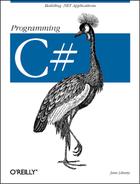It is a
design goal of C# that user-defined classes have all the
functionality of built-in types. For example, suppose you have
defined a type to represent fractions. Ensuring that this class has
all the functionality of the built-in types means that you must be
able to perform arithmetic on instances of your fractions (e.g., add
two fractions, multiply, etc.) and to convert fractions to and from
built-in types such as integer (int). You could,
of course, implement methods for each of these operations and invoke
them by writing statements such as:
Fraction theSum = firstFraction.Add(secondFraction);
Although this will work, it is ugly and not how the built-in types are used. It would be much better to write:
Fraction theSum = firstFraction + secondFraction;
Statements like this are intuitive and consistent with how built-in
types, such as int, are added.
In this chapter you will learn techniques for adding standard operators to your user-defined types. You will also learn how to add conversion operators so that your user-defined types can be implicitly and explicitly converted to other types.
In C#, operators are static methods whose
return values represent the result of an operation and whose
parameters are the operands. When you create an operator for a class
you say you have “overloaded” that operator, much as you
might overload any member method. Thus, to overload the addition
operator (+) you would write:
public static Fraction operator+(Fraction lhs, Fraction rhs)
It is my convention to name the parameters lhs and
rhs. The
parameter
name lhs stands for “lefthand side”
and reminds me that the first parameter represents the lefthand side
of the operation. Similarly, rhs stands for
“righthand side.”
The C# syntax for overloading an operator is to write the word
operator followed by the operator to overload. The
operator keyword is a method modifier. Thus, to
overload the addition operator (+) you write
operator+.
When you write:
Fraction theSum = firstFraction + secondFraction;
the overloaded + operator is invoked, with the
first Fraction passed as the first argument, and
the second Fraction passed as the second argument.
When the compiler sees the expression:
firstFraction + secondFraction
it translates that expression into:
Fraction.operator+(firstFraction, secondFraction)
The result is that a new Fraction is returned,
which in this case is assigned to the Fraction
object named theSum.
